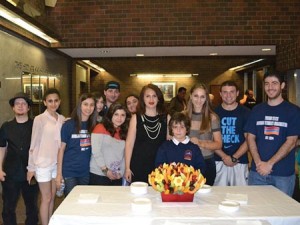Ruzan Orkusyan
Staff Writer

Photo: ASP Archive
The power of translation is the ability to overcome cultural barriers and make history and memories available to a global audience–this was the central theme of Dr. Sona Haroutyunian’s (University of Venice, Italy) second lecture in the series “The Theme of the Armenian Genocide in Literature, Translation, and Cinema.”
The lecture, given by Kazan Visiting Professor Haroutyunian on March 14, 2013 at Fresno State, explored the role of translation in the history and evolution of the Armenian Genocide, highlighting the greater global attention and understanding that translation has brought to the Armenian Genocide.
Dr. Haroutyunian expanded the definition of translation to encompass a series of events. “Thinking about the contribution of literature in raising awareness about the Armenian Genocide,” she said, “what I have asked myself is if literature is the immediate step after the historical event. According to me, it is not. The historical event comes first. What then follows is the translation of that event in the minds of the survivors, i.e., their memory and interpretation of the event.
Then, memory becomes the subject of oral history making the intergenerational transmission possible. The oral history comes into the minds of the writers of memoir and fiction, then there comes the literary translation and finally, the filmmaker, if such a story makes it to this step, translates the text in order to render the film as she or he has interpreted or translated the story. In effect, we have here different layers of translation upon translation—to use memoirist Gunter Grass’s term, with this theory we are ‘peeling the onion.’”
These different layers of translation upon translation are what enable personal memories and written words to take wing and reach a greater audience.
To illustrate her thesis, Dr. Haroutyunian gave a detailed account of the translation history of Antonia Arslan’s Skylark Farm. The novel is a historical narrative that has carried the Genocide beyond its historical facts and enriched it with new shades. As in many novels, the historical dimension of Arslan’s novel is introduced through conversations, character building, and other literary techniques.
But the real power of the novel is that it has surpassed the borders of Italy, its birthplace, accessing a global readership that has led to international awareness of the Armenian Genocide.
In countries such as Hungary, where the Armenian Genocide is not recognized, readers of the novel were appalled by the events described in the novel, and bewildered by the fact that these events were never mentioned in their history books. Dr. Haroutyunian also provided a stunning visual representation of the novel’s journey as it traveled across the globe and was translated into fifteen languages.
As the Armenian translator of Skylark Farm, Dr. Haroutyunian explained her own experience in translating the genocide novel. The task was intensely emotional. She described waking up in the mornings and feeling the duty to make the stories of the characters known. She even felt ashamed to take breaks to eat while the characters of the story starved in the deserts of Anatolia. All the characters were talking to her, crying to be heard.
Despite these and other challenges, Dr. Haroutyunian kept her promise to complete the translation before the movie release in 2007. More recently, she translated Arslan’s second novel, Road to Smyrna, which only exists in the Italian and Armenian editions.
Dr. Haroutyunian’s lecture and the heartbreaking passage from Road to Smyrna read in Armenian and English, captivated the audience, leaving many yearning for more information. Some of the audience remarked how it was regrettable that there was no Arabic translation of the novel. Dr. Haroutyunian explained that an Arabic translation was in progress and that a Turkish translation has been completed, but has never been published.
The lecture was enjoyable and engaging, and emphasized the key role translation plays in transmitting the culture and history of a people. In a way, it also urged attendees to record their own memories and experiences, as these may one day be valuable historical resources.
 Hye Sharzhoom Armenian Action
Hye Sharzhoom Armenian Action